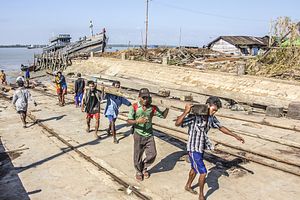While the world is focused on a China creating islands in the South China Sea, analysts and commentators may be missing another development in Chinese international affairs of equal importance. Very real environmental and regional security repercussions from the One Belt, One Road strategy are already emerging in the greater Mekong sub-region. And these impacts can be seen at first hand in the jungles and towns of Myanmar’s Kachin state and Sagaing region.
Two weeks ago, the Environmental Investigation Agency released a landmark investigation report titled Organised Chaos: The Illicit Overland Timber Trade Between Myanmar and China. The report highlighted a range of developments in the illicit timber trade between Myanmar and China that are arguably being driven by Chinese economic expansionism.
While the EIA stresses the importance of these developments to environment preservation, the report alludes to two worrying security trends. First, the unsustainable timber harvesting is symptomatic of the environmental sustainability challenges that will be faced in the ASEAN region when engaging with the one belt one road strategy. Second, the illegal timber trade, amongst other illicit markets, is undermining sovereignty and rule of law in the greater Mekong sub-region (Myanmar, Laos and Cambodia).
From a regional security perspective, the report also underscores the continued evolution of non-political or religiously motivated transnational organized crime in the greater Mekong sub-region.
Myanmar is a nation rich in natural resources: including timber, oil and precious gems. But in an economic sense the nation is income poor.
For many years its high value timber has been sold to China and Thailand at ultra-low prices. It is estimated that nearly a million cubic meters of illegal log imports, worth hundreds of millions of U.S. dollars, were sent into China in both 2013 and 2014.
In April 2014, Myanmar implemented a log export ban and regulations that prohibit the exporting of timber to China’s Yunnan Province. The ban was implemented to allow the central government time to develop its own domestic wood-processing industry. Such a domestic industry would dramatically increase national revenue from the sale of finished wood products and tax receipts.
In reality the ban has had no impact on the trade. The illegally harvested timber is being cut from forests in the Sagaing Division as well as the Kachin and Shan states. The logs are illegally harvested and access is often granted as a result of the payment of bribes.
From here the raw logs are transported by road through Myanmar government, military checkpoints and Kachin rebel checkpoints before arriving at Chinese border custom gates.
At the border, Chinese government officials apply taxes to the raw logs. And with the stroke of a Chinese government pen, illegally harvested and exported raw logs are legalized for processing.
Yunnan Province in China serves as a hub for transshipping processed timber to factories in south and east China. The bulk of the timber moving across the border is now high value species of rosewood and teak.
Rather than being a simple smuggling operation, the flow of illegally harvested timber is at an industrial level. The flow is lubricated at various points with facilitation payments being made to officials in Kachin, the Myanmar army, and Chinese customs. Chinese investments in dams and roads are providing greater access to areas for logging. Neither the people nor Myanmar’s national economy is profiting from this unsustainable trade in finite timber resources.
With the turn of the century, there has been a growing realization in some ASEAN states that the region is now entering a period of increased resource scarcity. While the opening up of the Vietnamese, Cambodian, Laotian and Myanmar economies has eased the short-term shortage, scarcity still looms large.
In the approaching era of natural resource scarcity, ASEAN states must be able to exercise sovereignty over their natural resources to ensure both their sustainable exploitation and access to appropriate royalties. There are additional challenges with the impending achievement of the ASEAN Economic Community (AEC); coordination between ASEAN economic spheres will be hard, particularly ensuring that the environmental ministries are included in the drafting of policies set to drive economic growth.
The challenge for ASEAN’s member states is where and how to disrupt the cross-border trade in timber to ensure the sustainability of the timber industry. For ASEAN states in the greater Mekong sub-region, the illicit trade in timber underscores border security failures. Non-state actors and transitional organized crime syndicates are directly challenging state sovereignty over their natural resources.
Australia has an important role to play in highlighting the regional security implications of the Myanmar timber crisis for ASEAN states. A regional response to the impacts of the growing primary resource scarcity in the region needs to be encouraged, especially with regards to the rapid exploitation of Laos and Myanmar’s timber resources by the Chinese.
Australia has an equally important role in promoting the economic and security benefits of sustainable economic growth in the greater Mekong sub-region to the Chinese.
Dr. John Coyne is Director of the border security program at the Australian Strategic Policy Institute. Formerly, he worked for the Australian Federal Police on transnational organized crime, national security, and counterterrorism.

































